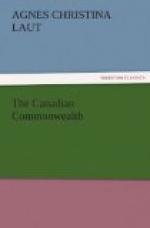When older democracies are curtailing the strength of veto power in upper houses, it is curious to find this dependence of a young democracy on veto power. Instead of the life privileges leading to an abuse of insolence and Big Business, up to the present in Canada, life tenure independent of politics has led to independence. The appointments being for life guarantees that many of the incumbents are not young, and this imparts to the Upper House that quality of the Witenagemot most valued by the ancient Saxons—the council of the aged and the experienced and the wise.
Active, aggressive power, of course, resides chiefly with the Commons. Representation here is arranged according to the population and must be readjusted after every census. “Rep. by Pop.” was the rallying cry that effected this arrangement. No property qualification is required from the member of the House of Commons, but he must be a British subject. He must not have been convicted of any crime, minor or major.
Franchise in Canada is practically universal suffrage. At least it amounts to that. Voters must be registered. They must be British subjects. They must be twenty-one years of age. They must not be insane, idiots or convicts. They must own real property to the value of three hundred dollars in cities, two hundred dollars in towns, one hundred and fifty dollars in the country; or they must have a yearly income of three hundred dollars. A farmer’s son has the right to vote without these qualifications, evidently on the ancient Saxon presumption that a free-holder represents more vitally the interests of a country than the penniless floater, who neither works nor earns. In other words, the carpet-bag voter does not yet play any part in Canadian politics. Bad as the corruption is in some cases among the foreigners, when votes are bought at two dollars to five dollars, the point has not yet been reached when a carpet-bag gang of boarding-house floaters and saloon heelers can be transferred from a secure ward to a doubtful ward and so submerge the political rights of permanent residents.
Judges can not vote in Canada. In fact, they can take no part, direct or indirect, by influence or speech, in politics. This was one of the things fought out in the ’37 Rebellion and forever settled. Canada could not conceive of a man who had been a judge being nominated for the premiership or as Governor. Of course, when Liberals are in power, as advisers of the Governor-General, they recommend more Liberals for judgeships than Conservatives; and when Conservatives are in power, they recommend for judgeships more Conservatives than Liberals. I think of attorneys who were penniless strugglers in the Liberal ranks of my childhood days in Winnipeg who are to-day dignified judges; and I think of other attorneys, who were penniless strugglers in Conservative ranks who have been advanced under the Borden regime to judgeships; but the point is, having been so advanced, they pass a chasm which they can never retrace without impeachment—the chasm is party politics. They are independent of popular favor. They can be impeached and displaced. They are forever disgraced by defalcation in office. By observing the duties of office, they are secure for life and held in an esteem second only to that of the Governor-General.




